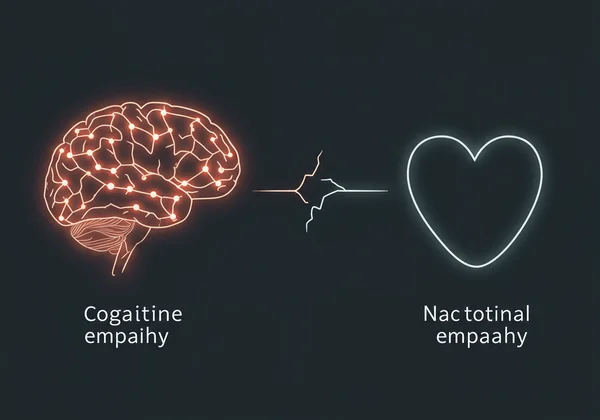Dark Empath Test: 8 Signs of Manipulative Empathy
August 17, 2025 | By Penelope Dean
Have you ever met someone who seems to understand you perfectly, only to use your vulnerabilities against you? This confusing and often painful experience can leave you questioning your judgment. If this sounds familiar, you may have encountered a "dark empath." The concept of a dark empath test isn't about diagnosing others, but about equipping yourself with the knowledge to recognize manipulative behaviors. How do I know if I'm dealing with manipulative empathy?
This article will break down this emerging psychological concept. We will explore what a dark empath is, reveal eight clear signs to help you identify this behavior, and explain how this knowledge can protect your emotional well-being. Understanding these patterns is the first step toward building healthier relationships, and it starts with understanding empathy itself. To see where you stand, you can always take a comprehensive online empathy quiz.
What is a Dark Empath? A Toxic Combination
A dark empath is a person who possesses high cognitive empathy—the ability to intellectually understand another person's emotions and perspective—but lacks significant emotional empathy, which is the ability to feel what others are feeling. This combination is particularly dangerous because they can read people like a book but use that insight for selfish, manipulative, or harmful purposes.
This personality profile is often associated with the "Dark Triad" traits: narcissism, Machiavellianism, and psychopathy. While a classic narcissist might struggle to understand others' feelings, a dark empath understands them very well and weaponizes that knowledge. They represent a more insidious form of emotional manipulation, one that is harder to detect because it's cloaked in a convincing performance of understanding and care.

Understanding Cognitive Empathy vs. Emotional Empathy
To truly grasp the nature of a dark empath, it's crucial to distinguish between the two main types of empathy. Cognitive empathy is the "thinking" part of empathy. It's the skill of recognizing and understanding someone else's mental state. A skilled therapist, a great salesperson, or a successful leader often has high cognitive empathy.
Emotional empathy, on the other hand, is the "feeling" part. It’s when you share the emotional experience of another person—you feel sad when they are sad, or happy when they are happy. It creates a genuine connection. Dark empaths are masters of cognitive empathy but have a major deficit in emotional empathy. They know how you feel, but they don’t care; they only see it as data to be used. This is why their "kindness" can feel so hollow.

Blending Dark Triad Traits with High Empathy
The concept of the Dark Triad helps explain the manipulative drive behind a dark empath. These traits are:
- Narcissism: Characterized by a grandiose sense of self-importance, a need for admiration, and a lack of concern for others' feelings.
- Machiavellianism: Involves manipulation, cynicism, and a strategic, calculating approach to life.
- Psychopathy: Marked by impulsivity, antisocial behavior, a lack of remorse, and shallow emotions.
A dark empath blends these darker motivations with the powerful tool of cognitive empathy. Their narcissism makes them desire control, their Machiavellianism provides the strategy for manipulation, and their psychopathic tendencies allow them to act without guilt. This creates a person who is adept at social maneuvering and emotional exploitation. If you are questioning your own emotional profile, an am I an empath test can be a useful starting point for self-reflection.
8 Signs You're Dealing with Manipulative Empathy
Recognizing a dark empath can be tricky because they are skilled chameleons. However, their patterns eventually emerge. Here are eight signs that the empathy you're receiving is actually a form of manipulation.
1. They Use Your Secrets for Malicious Humor or Guilt Trips
A dark empath will encourage you to be vulnerable and share your deepest secrets. At first, they seem like the perfect confidant. Later, however, they will subtly use that information against you. This can manifest as a "joke" at your expense in a group setting that hits a little too close to home, or a guilt trip that leverages your insecurities to make you do what they want.
2. Their Kindness Feels Calculated and Conditional
Genuine kindness is given freely. With a dark empath, kindness is a transaction. They will do something nice for you, but you'll soon realize it comes with strings attached. Their support is strategic, designed to make you feel indebted to them. This conditional kindness is a tool they use to ensure you remain compliant and useful to them.
3. They Excel at Covert Social Sabotage
Dark empaths are masters of relational aggression. Instead of confronting you directly, they will manipulate social situations to damage your reputation or relationships. They might spread subtle rumors, "accidentally" leave you out of plans, or play the victim to turn others against you. They use their understanding of group dynamics to isolate you while maintaining their own innocent facade.
4. You Feel Emotionally Drained Around Them
Spending time with a dark empath can be exhausting. Because their interactions are a performance, you may subconsciously sense the inauthenticity. Their ability to pinpoint your emotional state allows them to push your buttons perfectly, leaving you feeling confused, anxious, and depleted. If you consistently feel worse after interacting with someone, it's a significant red flag.

5. They Display a Subtle but Pervasive Sense of Superiority
While they may feign humility, a dark empath carries an underlying air of superiority. They see their ability to understand and manipulate people as a sign of their intelligence and sophistication. This may come out in condescending comments, a patronizing tone, or a general attitude that they know what's best for you and everyone else.
6. Their "Help" Is Designed to Create Dependency
A dark empath loves to be the rescuer, but their help is a trap. They will offer guidance and support that makes them indispensable, slowly eroding your self-confidence and ability to make decisions on your own. Their goal isn't to empower you; it's to make you dependent on them, which gives them a constant source of control and validation. Knowing your own strengths is key to resisting this, and a good first step is to test your empathy.
7. They Lack Genuine Emotional Reactions in Key Moments
Watch how they react when something truly good or bad happens to you. A dark empath can fake sympathy or excitement, but there’s often a flicker of something else—indifference, or even pleasure in your misfortune (schadenfreude). In moments that call for a genuine emotional response, their reaction can feel hollow, rehearsed, or slightly off. They know the right words to say but lack the authentic feeling behind them.
8. They Openly Admit to Understanding People to Get What They Want
Sometimes, a dark empath will tell you exactly who they are, but they frame it as a strength. They might say things like, "I'm just really good at reading people," or "I know how to handle people to get things done." They boast about their ability to manipulate as if it's a valuable skill, confident that you'll see it as a sign of their competence rather than a warning of their character.
How a Dark Empath Differs from a Classic Narcissist
It's easy to confuse a dark empath with a classic narcissist, but there is a key distinction that makes the dark empath potentially more dangerous. Answering the question "Am I an empath or a narcissist?" requires looking at how empathy is used.

The Key Difference: The Weaponization of Empathy
The most significant difference lies in the use of cognitive empathy. A classic narcissist often has low empathy across the board. They are so self-absorbed that they genuinely don't notice or understand how others feel, leading to clumsy and obvious harm. A dark empath, however, understands precisely how you feel. They see your emotional state, analyze it, and then use it as a weapon to achieve their goals. Their cruelty is not born from ignorance, but from calculated insight.
Primary Motivation: Psychological Control vs. Overt Admiration
A classic narcissist is primarily motivated by the need for external validation and admiration—they want to be praised and seen as superior. Their manipulation is often loud and centered on feeding their ego. A dark empath, in contrast, is more interested in subtle psychological control. They derive satisfaction from orchestrating situations and puppeteering people from behind the scenes. Their reward is the quiet knowledge that they are in control.
Protect Yourself: Turn Knowledge into Action
Trust your gut. The primary power a dark empath holds is making you doubt your own perceptions. If a relationship consistently leaves you feeling drained, confused, or devalued, that feeling is valid. Use this knowledge not to label others, but to empower yourself. You have the right to set firm boundaries and disengage from relationships that are built on exploitation.
Protecting yourself from manipulative personalities begins with a strong foundation of self-awareness. Are you a highly empathetic person, potentially more susceptible to their tactics? Or do you want to better understand your own emotional landscape? Discover your unique profile with our free, science-based empathy test. Knowing yourself is the best defense against those who would use your emotions against you.
Frequently Asked Questions About the Dark Empath
Is there an official, clinical "dark empath test"?
No, there is currently no official clinical diagnosis or standardized test for the "dark empath" personality. The term is a relatively new concept in psychology used to describe a specific combination of Dark Triad traits and high cognitive empathy. While you can't diagnose someone, you can use the signs as a framework to recognize unhealthy relational patterns. Tools like a general empathy scale online can help you assess your own empathic tendencies, which is a crucial part of self-awareness.
What is the root cause of a dark empath personality?
The exact root cause is not yet fully understood and is likely a combination of genetics, upbringing, and environment. Like other personality structures, it's believed that a predisposition to low emotional empathy (nature) combined with early life experiences that reward manipulative behavior or punish genuine emotional expression (nurture) could contribute to its development. Research into this specific personality profile is still ongoing.
Can a person without empathy love someone?
A person with very low emotional empathy, like a dark empath, struggles to experience love in a genuine, selfless, and emotionally connected way. They may be able to form relationships based on utility, shared interests, or a desire for control and admiration. However, these connections often lack the true warmth, reciprocity, and vulnerability that are hallmarks of deep, authentic love. Their "love" is more of a transactional and self-serving attachment than a deep emotional bond.